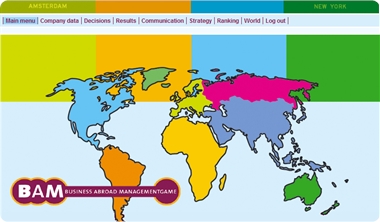International Business Game
In the International Business Game, players act as the managers of international bicycle companies. Based on facts and events (demographic, political instability, climate, GDP, etc.), players determine strategic international decisions (such as building a factory in Brazil or in the UK, using an expat in China but a local manager in Denmark).
How does it work?
All teams are competitors and share the same goal: to become world leaders in bicycle production and sales.
The game is played in rounds, with each round representing 1 year of operations. As there is no minimum time period which must pass before the next round can be played, different rounds can be played on the same day should the players wish. After every round, a new country opens its borders. This means that teams start with only 4 countries to choose among for investment and sales and end the game with 10.
Subjects in the game
The International Business Game is a modular game, which means that it can easily be customised reflect the themes and concepts you wish to highlight. We can show or hide some of the different decisions, strategies and results so that the focus remains related to the content of a player’s course.
Decisions
The game’s decisions consist of the following subjects:
Decisions per country:
- Build factories
- Build distribution center
- Market research
- General policy
- Expat policy
- Sustainability (CSR)
- R&D
- Production sources
- Marketing
Strategies
Strategies implemented in this game are:
- Competitive Advantage of Porter
- Growth strategy of Anshoff
- SWOT
- Mission / vision
- Targets
- Balanced Score Card of Kaplan & Norton
- Market definitions
Results
Given information in this game which should be possessed by players to determine their new decisions:
- Balance sheet
- Income statement
- Cash balance
- Inventory
- Market research
- Profit contribution
- Production
- Sales summary
- Market research
- Balanced Score Card

More information
Request more information
Fast facts
- Online game
- Played in teams
- Competitive setting
- Easy to adjust with extra assignments and cases
- Amount of rounds: 4 to 12 (optimum around 7)
- Time indication: avg. 60-90 minutes per round
- "On site" or distance learning possible

